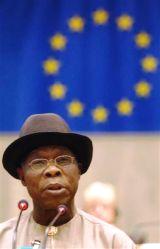Leaders advocate federal model to solve conflicts in Iraq, Cyprus, Sudan
By CONSTANT BRAND, Assocaited Press writer
BRUSSELS, Belgium, Mar 3, 2005 (AP) — Government leaders from Africa, Europe and North America opened a conference on federalism Thursday, arguing that the benefits of regional government systems could end conflicts in countries such as Iraq, Cyprus and Sudan.

|
|
Nigeria’s President Olusegun Obasanjo addresses the audience at the plenary room of the European Parliament in Brussels, Thursday, March 3, 2005. (AP). |
Belgian Prime Minister Guy Verhofstadt said federalism could promote peace and stability, especially in the Middle East and Africa.
“The facts prove that it is definitely the right way to prevent conflicts, whether between cultures, languages, or religions,” Verhofstadt said at the conference, the third of its kind since 1999.
Bilingual Belgium’s Francophone and Dutch-speaking populations share power, and Verhofstadt said that model could be useful for Iraq as it drafts its new constitution. He recommended that the new government be a federal one, with regional governments run by Sunnis, Shiites and Kurds.
“It won’t be easy at all, for Iraq has various languages, ethnic groups and religions,” he said, and whether such a system could offer enough autonomy must be studied.
“It could be a way to achieve the so much-needed stability that is lacking today,” he said.
“It’s a solution, a way to respect diversity,” said Canadian Intergovernmental Affairs Minister Lucienne Robillard, adding that Canada was looking into whether it could help draft an Iraqi constitution. “For Sudan, too, it’s a solution.”
Nigerian President Olusegun Obasanjo, who currently holds the presidency of the African Union, said federalism offered African nations like his a way to provide rights and powers to minorities.
“With over 350 languages and even more dialects, Nigerians feel they are respected and represented at the center,” Obasanjo told the conference.
Cypriot President Tassos Papadopoulos agreed that federalism could also bring a resolution to the decades-long division of his Mediterranean island.
“I still remain committed to a settlement of the Cyprus problem on the basis of a … bicommunal federal solution,” Papadopoulos said, but added that under such a system of two regional governments _ one Greek and the other Turkish, which was pushed by the United Nations _ “no community should be able to impose its will on the other.”
Cyprus, which joined the European Union last year, has been split into the Greek Cypriot-controlled south and the Turkish-occupied north since Turkey invaded in 1974 in the wake of an abortive coup by supporters of union with Greece. The breakaway state in the north is only recognized by Turkey, which maintains 40,000 troops there and it does not enjoy the benefits of EU membership.
Verhofstadt said one of the main goals of the three-day conference is to share ideas on solutions to ethnic conflicts.
Some 12 expert workshops were to focus on drafting proposals for Saturday’s closing session on how federalism could work in conflict zones, and on giving political power to minorities in Cyprus, Afghanistan, Sudan, Congo and Iraq.
Josep Borrell, president of the EU’s European Parliament, suggested that the EU also could serve as a model for certain countries, pointing to the history of the 25-nation bloc, born out of World War II to prevent future wars on the European continent.
Other speakers expected to address the conference Saturday include Sudanese Vice President Ali Osman Mohammed Taha and John Garang, head of the main southern Sudanese rebel group that signed the Sudan north-south peace deal.
That accord is meant to end the country’s 21-year civil war but is threatened by ongoing fighting in Darfur.
